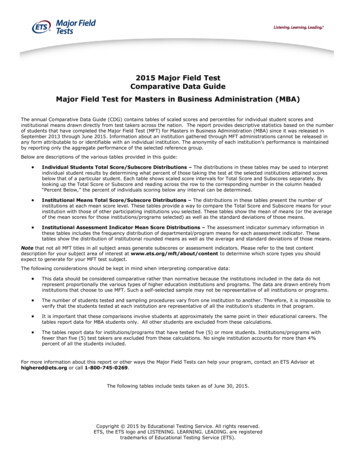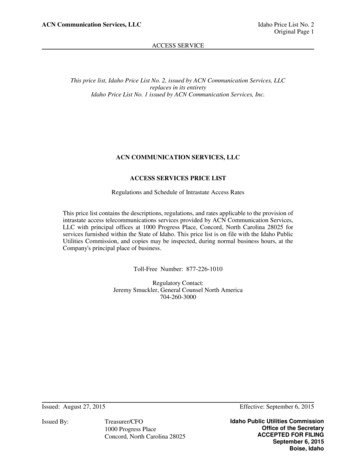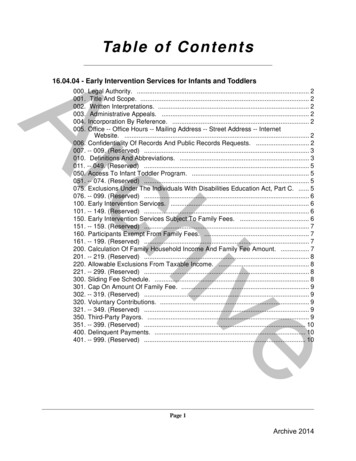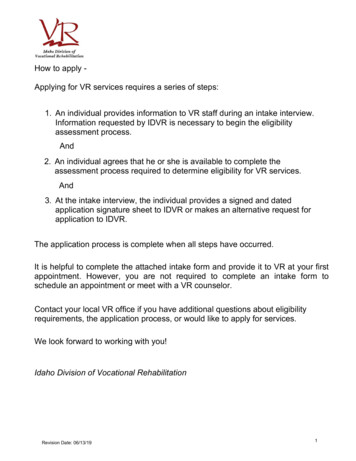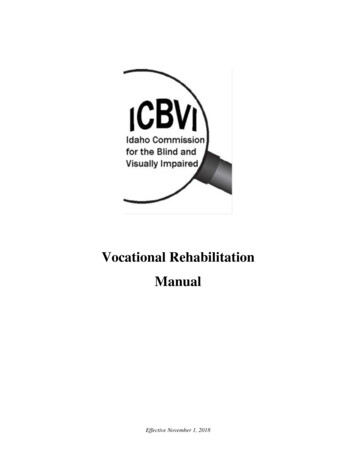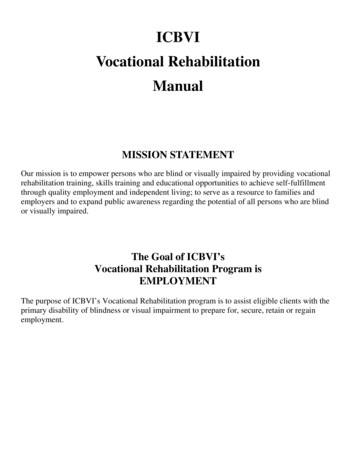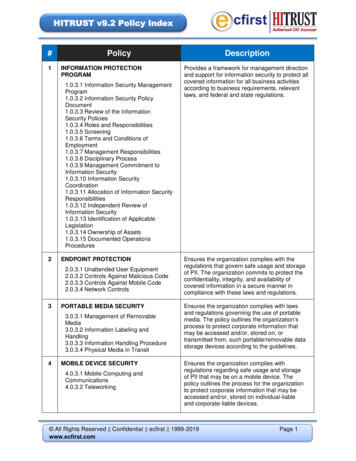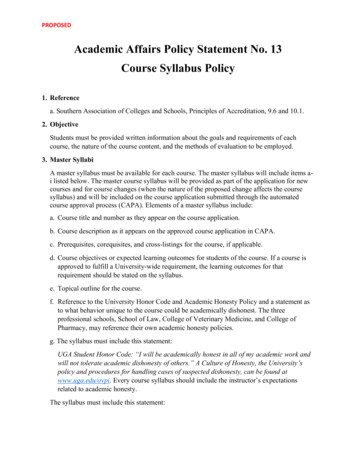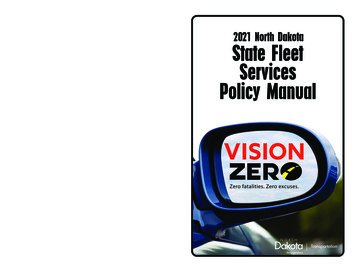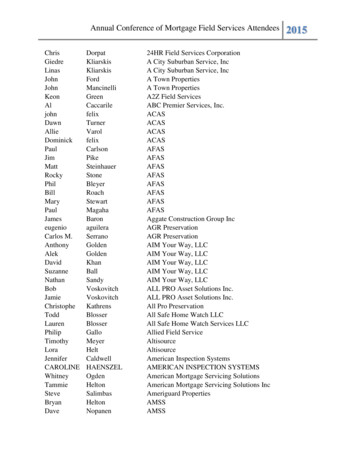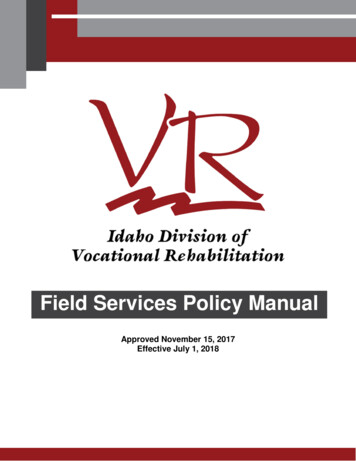
Transcription
Field Services Policy ManualApproved November 15, 2017Effective July 1, 2018
Table of ContentsSection 1.0 - Purpose and General Requirements of the Idaho VocationalRehabilitation Participant Services Program. 11.1 Legal Citations . 21.2 Program Requirements . 21.3 Provider Standards . 31.4 Selection of Service Providers . 31.5 Definitions . 31.6 Use of Audio and Video Recordings . 161.7 Customer Reasonable Accommodation Request and GrievanceProcess . 16Section 2.0 - Ethics . 18Section 3.0 - Protection, Use, and Release of Personal Information . 23.1 Confidentiality . 193.2 Release of Personal Information to Customers with Disabilities,their Representative or Attorney . 193.3 Release to Other Agencies or Organizations . 203.4 Release in Response to Investigations in Connection with LawEnforcement. 203.5 Release for Audit, Evaluation or Research . 203.6 Subpoena for Release of Information to the Courts, Other JudicialBodies, Worker’s Compensation and Law Enforcement Agencies . 213.7 Social Security Information . 21Section 4.0 – Appeals Process . 224.1 Continuation of Services Pending Completion of the Hearing . 234.2 Client Assistance Program (CAP) and Supervisory Review . 234.3 Dispute Resolution Process . 234.4 Mediation . 244.5 Fair Hearing Process . 25Section 5.0 – Application and Eligibility Determination . 275.1 Inquiry . 275.2 Referral . 275.3 Application for Idaho Division of Vocational Rehabilitation (IDVR)Services . 285.4 Assessment for Determining Eligibility and Priority for Services . 295.5 Eligibility Criteria . 30i Page
5.6 Review and Assessment of Data for Eligibility Determination . 33Section 6.0 - The Determination of Significance of Disability . 416.1 Policy . 366.2 Definitions . 366.3 Procedures . 37Section 7.0 – Assessment of Vocational Rehabilitation Needs . 417.1 Primary Source of Information . 417.2 Comprehensive Assessment of Rehabilitation Needs . 417.3 IPE Development . 437.4 Medical Consultation Policy . 44Section 8.0 - Customer Financial Participation . 46Section 9.0 – Purchase of Services and Supplies for Participant Use in theVocational Rehabilitation Program. 49Section 10.0 - Individualized Plan for Employment (IPE) . 5210.1 Options for Developing the IPE . 5210.2 Developing the Vocational Goal . 5310.3 Ticket to Work . 5310.4 The IPE must include the following: . 5410.5 Annual Review . 56Section 11.0 - Comparable Services and Benefits . 5711.1 Comparable Services and Benefits . 5711.2 Exempt Service . 5811.3 Timeliness of Comparable Benefits . 58Section 12.0 - Vocational Rehabilitation Services . 5912.1 Timeliness. 5912.2 Agency Payment Policy . 5912.3 Counseling and Guidance . 7012.4 Physical and Mental Restoration Services . 7112.5 Training Services . 7212.6 Benefits Counseling . 7512.7 On-the-Job Supports . 7512.8 Job Placement Services. 7512.9 Vehicle Purchase . 7812.10 Self-Employment Policy . 80ii P a g e
12.11 Effective Communication Services for Customers with SensoryImpairments .10712.12 Occupational Licenses, Tools, Equipment, Initial Stocks, andSupplies Necessary in Order to Enter an Occupation .10812.13 Supported Employment Services .10812.14 Post-Employment Services (PES) .11412.15 Rehabilitation Technology .11412.16 Supportive Services .11612.17 Pre-Employment Transition and Transition Services for Studentsand Youth .11712.18 Services to Family Members .12212.19 Personal Care Assistant Services .12412.20 Services to a Group of Individuals .125Section 13.0 - Closure .12913.1 Closure during Application Status .12913.2 Closure during Eligibility Status .13213.3 Unsuccessful Closure after Implementation of IPE .13413.4 Successful Competitive Closure after Implementation of IPE .13513.5 Closure after Post Employment Services (PES) .138Section 14.0 - Order of Selection .13914.1 Authority.13914.2 Factors Prohibited in Order of Selection Consideration .13914.3 Administrative Requirements .13914.4 Procedures .14014.5 Information and Referral (I & R) .14114.6 Post Employment Services .142Section 15.0 - Services for Individuals Employed or Seeking Employment atSubminimum Wage .14315.1 Authority.14315.2 Definitions .14315.3 Purpose .14315.4 General Requirements for CC/I&R .14415.5 Additional Requirements for Youth .14415.6 Documentation .144iii P a g e
Section 1.0 - Purpose and General Requirements of the Idaho VocationalRehabilitation Participant Services ProgramThe Idaho Division of Vocational Rehabilitation (IDVR) program assists eligiblepersons with disabilities to prepare for and achieve an employment outcome.“Employment outcome” means entering or retaining full-time, or if appropriate,part-time competitive employment in the integrated labor market to the greatestextent possible. It also means supported employment; or other types ofemployment, including self-employment, consistent with self-sustaining activityfor wages or compensation consistent with the customer’s strengths, resources,priorities, concerns, abilities, capabilities, interest, and informed choice.Competitive employment is work performed in the integrated labor market inwhich the customer is compensated at or above minimum wage, but not lessthan the customary wage and benefits paid for the same or similar workperformed by customers who do not have a disability.The IDVR is a statewide program that develops and utilizes partnerships foreffective service delivery. Partnerships vary, but include those programsauthorized under the Rehabilitation Act, as amended, such as IndependentLiving Centers and Tribal Vocational Rehabilitation Programs. Programsauthorized under the Workforce Innovation and Opportunity Act (WIOA) areutilized to the maximum extent possible as allowed in Section 188 of the Act. Itis understood that each program is unique and offers unique cultural andprofessional expertise. Cooperative Agreements with respective programs areencouraged and should be referred to for local understanding. Staff isencouraged to understand these agreements and provide information, referraland services as appropriate to the needs of the customers they serve. Consultwith the RM for access to pertinent cooperative agreements.Vocational Rehabilitation is based upon an Individualized Plan for Employment(IPE) that is oriented to the achievement of an employment outcome. Servicesprovided to persons with disabilities must be documented as necessary toovercome related barriers to employment and must be provided as costeffectively as possible.The Division strives to maintain a highly accountable program to all customers.IDVR provides, as appropriate to the vocational rehabilitation needs of eacheligible customer, goods or services necessary to enable the customer toachieve an employment outcome.1 Page
Exception to PolicyVRCs are delegated substantial decision and purchasing authority based uponthe maximum agency contributions outlined in the Payment Policy. Exceptions topolicy require the approval of a RM and the notification and consultation of theChief of Field Services. Documentation of the RM’s approval must be noted inthe case file.Purchases in excess of delegated authority are reviewed by the RM andapproved by the Chief of Field Services or designee. Documentation of theapproval of purchases in excess must be noted in case file.1.1 Legal CitationsThe IDVR program is operated in compliance with the Federal Rehabilitation Actof 1973, as amended by the Workforce Innovation and Opportunity Act (WIOA)enacted on July 22, 2014. The legal authorities for the policies contained in theVocational Rehabilitation Services Policy Manual are: Proposed Rules to Title 34CFR Parts 361, 363, and 397 issued April 16, 2015 in the Federal Registerimplementing the Rehabilitation Act Amendments; and Title 67, Chapter 53 of theIdaho code related to provisional appointments in state government for thosewith severe disabilities.1.2 Program RequirementsEligibility is determined without regard to sex, race, creed, age, color, nationalorigin or type of disability.There is no duration of residency requirement. The customer must be living in theState of Idaho and legally able to work in the United States.IDVR will establish and maintain a record of services for each customer for, andrecipient of, vocational rehabilitation services, which includes data necessary tocomply with IDVR agency and Federal Rehabilitation Service Administration(RSA) requirements.In the purchase of goods or services for persons with disabilities, IDVR complieswith its procurement policy, Purchase of Services and Supplies for customer usein the Vocational Rehabilitation Program.Goods and services will be provided subject to the guidelines of Order ofSelection (Section 14.0).When appropriate, counselors shall refer customers with disabilities to receive2 Page
services from other agencies and organizations.Each applicant or eligible customer being provided vocational rehabilitationservices shall be informed of the procedure for requesting a review and adetermination of agency action concerning the furnishing or denial of services,including the names and addresses of individuals with whom appeals may befiled and the availability of the Client Assistance Program (CAP).1.3 Provider StandardsIDVR requires service providers:To be licensed by the Division of Occupational Licensing, the U.S. Department ofEducation Office of Post-Secondary Education, or a professional certifying body.ORIDVR requires service providers that offer vocational rehabilitation services toapply to be an approved service provider with the Division. CRPs must beaccredited based on IDAPA rules.ORVRCs may occasionally approve the purchase of services from non-licenseproviders such as, educational tutoring, foreign language interpreters, or otherservices to support the rehabilitation needs of a customer.1.4 Selection of Service ProvidersProviders are selected by a combination of the customer’s informed choice andState procurement rules. VRCs will assist the customer in acquiring informationnecessary to make an informed choice regarding the selection of serviceprovider.1.5 Definitions:a. Applicant means, customer who submits an application for vocationalrehabilitation services in accordance with Sec. 361.41(b) (2). (Authority:Section 12(c) of the Act; 29 U.S.C 709 (c))b. Assessment for determining eligibility and vocational rehabilitationneeds means, as appropriate in each case, (i)(A) A review of existingdata—(1) To determine if a customer is eligible for vocational rehabilitationservices; and (2) To assign priority for an Order of Selection described inSec. 361.36 in the States that use an Order of Selection; and (B) To theextent necessary, the provision of appropriate assessment activities toobtain necessary additional data to make the eligibility determination and3 Page
assignment; (ii) To the extent additional data are necessary to make adetermination of the employment outcomes and the nature and scope ofvocational rehabilitation services to be included in the individualized planfor employment for an eligible customer, a comprehensive assessment todetermine the unique strengths, resources, priorities, concerns, abilities,capabilities, interests, and informed choice, including the need for supportemployment, of the eligible customer. This comprehensive assessment –(A) is limited to information that is necessary to identify the rehabilitationneeds of the customer and to develop the individualized plan ofemployment of the eligible customer; (B) Uses as a primary source ofinformation, to the maximum extent possible and appropriate and inaccordance with confidentiality requirements –1) Existing information obtained for the purposes of determining theeligibility of the customer and assigning priority for an Order ofSelection described in Sec. 361.36 for the customer; and2) Information that can be provided by the customer and, if appropriate,by the family of the customer; (c) May include, to the degree neededto make such a determination, an assessment of the personality,interests, interpersonal skills, intelligence and related functionalcapacities, educational achievements, work experience, vocationalaptitudes, personal and social adjustments, and employmentopportunities of the customer and the medical, psychiatric,psychological, and other pertinent vocational, educational, cultural,social, recreational, and environmental factors that affect theemployment and rehabilitation needs of the customer; and (D) Mayinclude, to the degree needed an appraisal of the patterns of workbehavior of the customer and services needed for the customer toacquire occupational skills and to develop work attitudes, work habits,work tolerance, and social and behavior patterns necessary forsuccessful job performance, including the use of work in real jobsituations to assess and develop the capacities of the customer toperform adequately in a work environment; (iii) Referral, for theprovision of rehabilitation technology services to the customer, toassess and develop the capacities of the customer to perform in awork environment; and (iv) An exploration of the customer’s abilities,capabilities, and capacity to perform in work situations, which must beassessed periodically during trial work experience, including4 Page
experiences in which the customer is provided appropriate supportsof training.(Authority: Section 7(2) and 12 (c) of the Act; 29 U.S.C. 705(2) and709 (c))c. Assistive technology device means any item, piece of equipment, orproduct system, whether acquired commercially off the shelf, modified, orcustomized, that is used to increase, maintain, or improve the functionalcapabilities of a customer with a disability. (Authority: Sections 7(3) of theAct; 29 U.S.C. 705(3))d. Assistive technology service means any service that directly assists acustomer with a disability in the selection, acquisition, or use of an assistivetechnology device, including; (i) The evaluation of needs of a customer witha disability, including a functional evaluation of the customer in his or hercustomary environment; (ii) Purchasing, leasing, or otherwise providing forthe acquisition, by a cus
Vocational Rehabilitation Services Policy Manual are: Proposed Rules to Title 34 CFR Parts 361, 363, and 397 issued April 16, 2015 in the Federal Register implementing the Rehabilitation Act Amendments; and Title 67, Chapter 53 of the Idaho code related to provisional appointment

